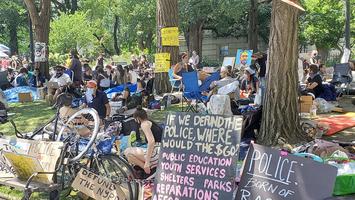
Protests have spread across the United States for months now, along with calls for defunding local police departments. But the movement to defund police has a crucial flaw: the policy that it seeks would harm the minority communities whom the protesters claim to care about. Moreover, those communities don’t even agree with it.
Cities such as Los Angeles, San Francisco, Austin, Seattle, Minneapolis, and Portland are making significant cuts to their police budgets, while others, including Houston, Chicago, and Newark, have maintained or even increased spending levels on law enforcement. The glaring differentiator between these cities: those with black mayors or many black council members have opposed demands to cut their police budgets. Even in New York City, where Mayor de Blasio agreed to some cosmetic cuts, some black and Latino council members opposed even these.
A recent Gallup poll found that 81 percent of African-Americans opposed reducing police in their neighborhoods; 61 percent wanted the same amount of police, while 20 percent wanted more. (Out of the four major ethnic groups, Asian-Americans were the most likely to want reduced police presence in their neighborhoods.) This black support for more police comes even as black respondents to the poll reported the highest frequency of police interactions and the lowest confidence that their interactions will result in positive treatment.
The “defund the police” movement is backed by progressive activists and politicians, who in turn are funded by nonprofit social-justice organizations and money from corporations shaken down by agitator groups like Black Lives Matter, which pose as community organizations, though they have little popular representation or membership. They champion the most adverse policies for the very citizens they claim to be fighting for.
Amid the protests in New York City, filmmaker Ami Horowitz walked around interviewing residents about defunding the police. Horowitz found wide support for defunding and a widespread hatred of the police among white hipsters in the affluent, mostly white East Village. Some said that black Americans would be “infinitely” better off if the police were abolished.
When Horowitz went to Malcolm X Boulevard in Harlem and interviewed black New Yorkers about the same topic, however, he heard the opposite response. “People would be just going crazy,” one man said. “It would be worse than what it is. Robberies, looting, raping, murder.” Another local said, “Abolishing the NYPD, that would be suicide.”
This sentiment is shared widely among black Americans of all political stripes. When the Houston city council was swamped with testimony from residents pushing for the dismantling of the Houston Police Department, black council members pushed back, saying that these people clearly didn’t spend time in the communities that they claimed to support. The black mayor of Houston, Sylvester Turner, supported an increase in the police budget.
Progressives and radicals don’t understand, or don’t care, that black neighborhoods need the police. Especially in the current economic climate, black communities are struggling financially and can’t afford to contract with private security, hire off-duty cops, or secure constable protection to patrol their neighborhoods, as some better-off areas can do.
Read the rest of this piece at City Journal.
Charles Blain (@cjblain10) is the president of Urban Reform and Urban Reform Institute. He is based in Houston and writes on municipal finance, urban politics, and other issues.
Photo credit: Vladimir via Wikimedia under CC 2.0 License.












